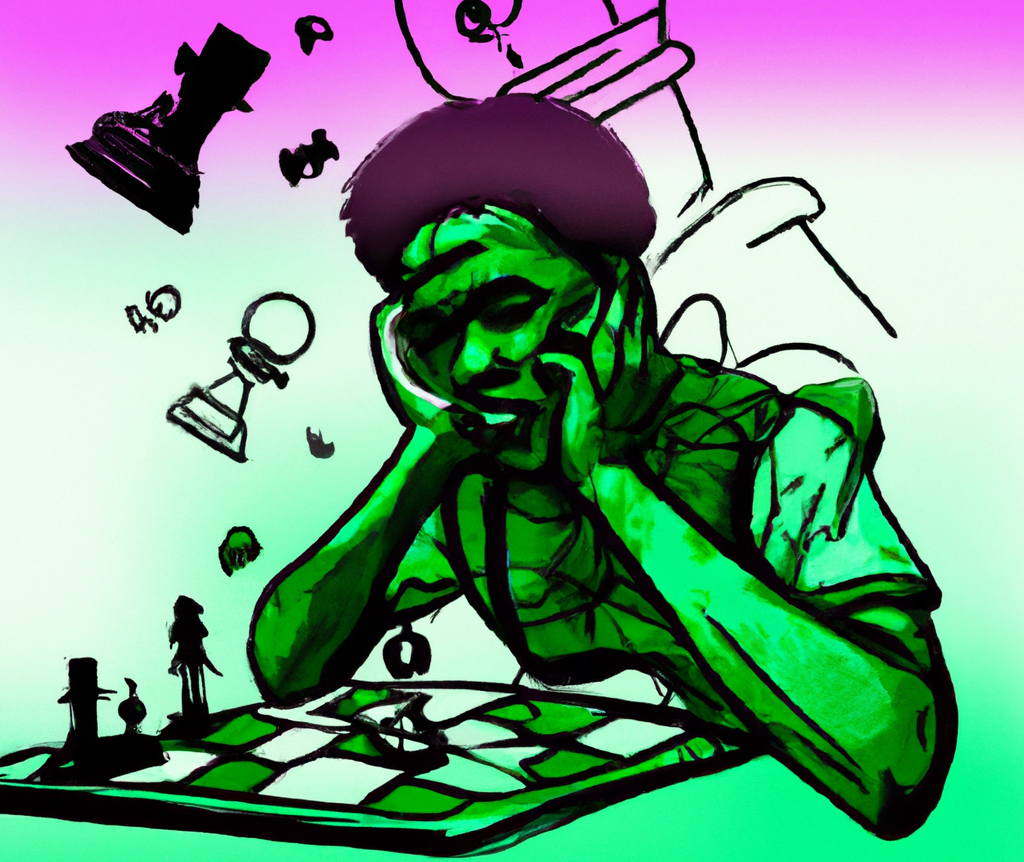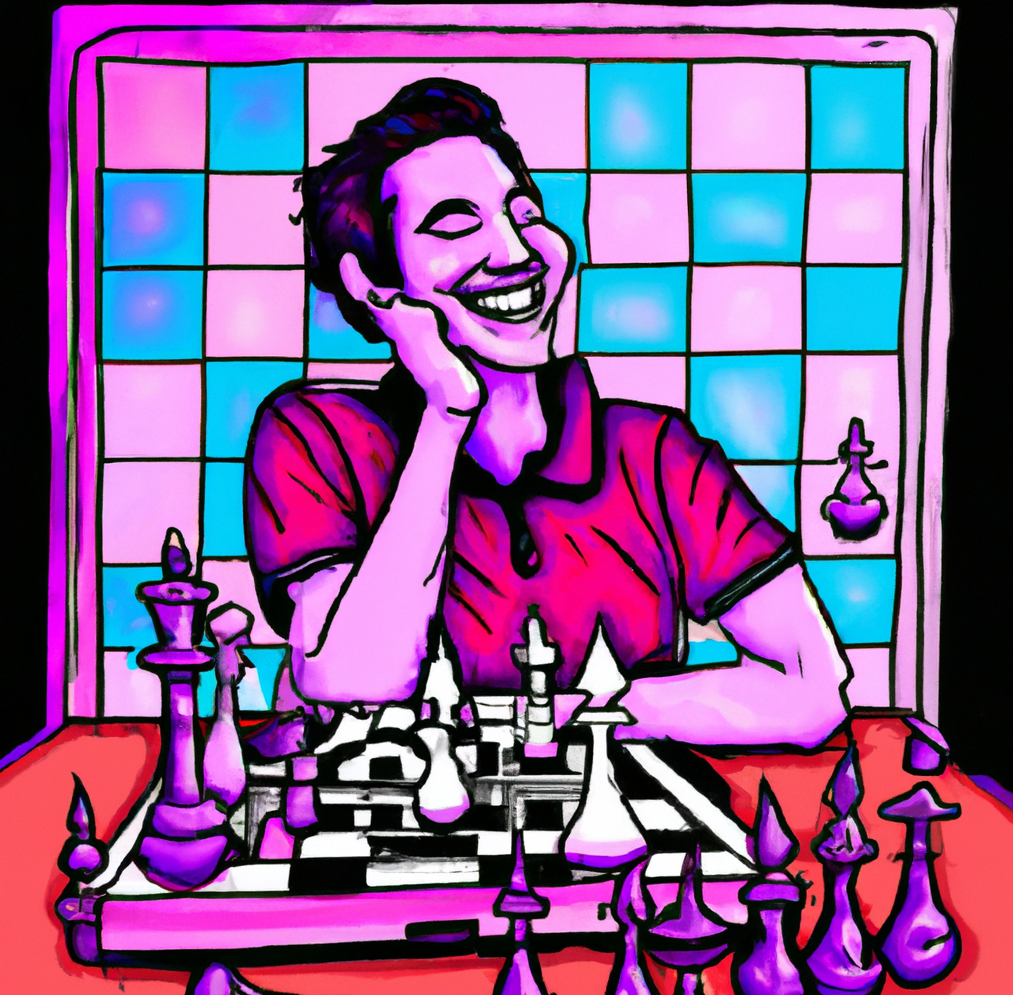Can Chess Cause Stress?
While playing chess can provide many benefits, including improved concentration, problem-solving skills, and critical thinking, it can also cause stress. In fact, some people find the intensity of chess to be overwhelming and avoid playing the game altogether. Not to mention the stress you feel when blundering a piece or running out of time. Today, we’ll discover how exactly chess causes stress and what we can do against that.

This is Why You Feel Stressed While Playing Chess
The intense concentration, decision-making, and competitiveness of the royal game can all contribute to feelings of stress and anxiety. It is important for players to be aware of these potential sources of stress and to take steps to manage their stress levels while playing chess. We’ve discovered 6 reasons while you might feel stressed out during – or after – a chess match. Let’s dive in!
1. Pressure To Perform Well and Win The Game
Chess can cause stress because it is a competitive game where players strive to outsmart and defeat their opponents. The pressure to perform well and win the game can be intense, especially in high-stakes tournaments or matches where a player’s reputation or ranking is on the line.
This constant mental strain can lead to feelings of anxiety and pressure, which can be stressful for players. Additionally, the fear of losing can be a major source of stress in chess, as players may feel like they have let themselves or others down if they do not emerge victorious.
2. Need To Constantly Think and Plan Ahead
Chess is a game that requires players to constantly think and plan ahead in order to outmaneuver their opponents. This can be a source of stress for several reasons. First, the mental demands of chess can be intense, as players must constantly evaluate potential moves and anticipate their opponent’s actions. This can lead to feelings of anxiety and pressure, as players may feel like they need to make the right decision quickly in order to stay one step ahead. Second, the need to constantly think and plan ahead can be mentally exhausting, as it requires sustained concentration and focus. This can lead to feelings of fatigue and burnout, especially during long games or tournaments.
3. Time Constraints of Each Player’s Turn
In a typical chess game, players have a limited amount of time to make their moves. This can put pressure on players to think quickly and make decisions under time constraints, which can be stressful. Additionally, if a player takes too long to make their move, they may lose on time, adding to the stress of the game.
4. Long-lasting and Complex Games
While a lot of chess games today are played in shorter time formats, matches can last for several hours, and some high-level tournaments can even last for several days. This can be stressful for players who must remain focused and mentally sharp for extended periods of time. The stakes in a long-lasting chess match can be high, with players competing for prizes, ranking points, and other rewards. The combination of extended mental effort and high stakes can make chess a stressful game for some players.
5. Blundering and Making Mistakes
In chess, a blunder is a major mistake that can have significant consequences in the game. For example, a player might accidentally put their king in a position where it can be checkmated, or they might miss an obvious threat to their own queen. Blunders can be very frustrating and stressful for players, especially if they result in the loss of a game or a significant advantage for the opponent. Simply the fear of making a blunder can cause stress for some players, who may feel pressure to play perfectly in order to avoid making mistakes.
6. Need to Constantly Improve and Stay Competitive
Players are constantly striving to improve their skills and knowledge in order to stay competitive in the chess world. This can be stressful because it requires a significant amount of time, effort, and dedication. Additionally, the chess world is highly competitive, with players constantly battling for ranking points, prizes, and other rewards. This competition can create pressure for players to perform at their best, which can be stressful. The combination of the need to improve and the pressure to perform can make chess a stressful game for even the best of the best.
How to Stay Calm While Playing Chess (4 Tips)
Here are 4 tips we encourage you to try if you struggle with aggression or stress during chess games. Let us know how they worked for you by contacting us.
- Take deep breaths. Taking slow, deep breaths can help you relax and calm your mind. This can be especially useful if you’re feeling anxious or stressed before or during a chess game.
- Focus on the present moment. Instead of worrying about the outcome of the game or getting caught up in past mistakes, try to focus on the present moment and the task at hand. This can help you stay calm and avoid getting overwhelmed.
- Avoid overthinking. It’s natural to want to analyze every move and consider all the possible outcomes, but overthinking can lead to indecision and unnecessary stress. Instead, try to trust your instincts and make the best move you can based on the information you have.
- Practice mindfulness. Mindfulness is the practice of being present and fully engaged in the moment, without judgment. This can help you stay calm and focused during a chess game by allowing you to let go of distractions and stay in the present moment. You can practice mindfulness by taking a few minutes to focus on your breath or by paying attention to your thoughts and feelings without getting caught up in them.
Hikaru Nakamura also raised some intersting points on how to stay focussed and avoid stress when playing chess in a recent Podcast with Lex Fridmann:
Yes, Chess Can Also Reduce Stress!
Now this article seems to bash chess for being a not-enjoyable experience, which is definitely what we want to bring across! That’s why we also wrote a detailed article on how chess can actually help relieve stress, if you’re interested in that. Here is a short rundown of that article.

Playing chess can help alleviate stress by providing a distraction from the sources of stress and allowing the mind to focus on a specific task. The act of thinking about chess moves and strategies can also be meditative, helping to quiet the mind and relax the body.
While the the immediate stress-reducing effects of playing chess are very real, the game can also help improve mental and emotional well-being in the long term. Playing chess requires concentration and problem-solving skills, and regularly engaging these abilities can help strengthen the brain and improve cognitive function. This can lead to a greater sense of control and confidence, which can in turn help reduce stress and anxiety.
As we covered in our article on how chess can relieve stress, playing chess can also provide a sense of accomplishment and satisfaction. The sense of achievement that comes from successfully executing a well-planned strategy or outmaneuvering an opponent can be a great source of pride and can boost self-esteem. This can help counteract the negative effects of stress and provide a sense of fulfillment.
And finally, in addition to the individual benefits of playing chess, the game can also provide a social outlet and a chance to connect with others. Playing chess with friends or joining a chess club can provide a sense of community and belonging, which can be a powerful stress-reliever.

